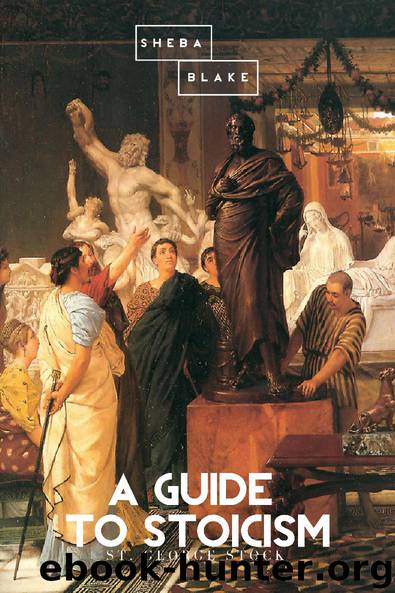A Guide to Stoicism by St. George Stock

Author:St. George Stock [Stock, St. George]
Language: eng
Format: epub
Publisher: manybooks.net
PHYSIC.
We have now before us the main facts with regard to the Stoic view of man's nature, but we have yet to see in what setting they were put. What was the Stoic outlook upon the universe? The answer to this question is supplied by their Physic.
There were, according to the Stoics, two first principles of all things, the active and the passive. The passive was that unqualified being which is known as Matter. The active was the Logos, or reason in it, which is God. This, it was held, eternally pervades matter and creates all things. This dogma, laid down by Zeno, was repeated after him by the subsequent heads of the school.
There were then two first principles, but there were not two causes of things. The active principle alone was cause, the other was mere material for it to work on--inert, senseless, destitute in itself of all shape and qualities, but ready to assume any qualities or shape.
Matter was defined as that out of which anything is produced. The Prime Matter, or unqualified being, was eternal and did not admit of increase or decrease, but only of change. It was the substance or being of all things that are.
The Stoics, it will be observed, used the term "matter" with the same confusing ambiguity with which we use it ourselves, now for sensible objects which have shape and other qualities, now for the abstract conception of matter, which is devoid of all qualities.
Both these first principles, it must be understood, were conceived of as bodies, though without form, the one everywhere interpenetrating the other. To say that the passive principle, or matter, is a body comes easy to us, because of the familiar confusion adverted to above. But how could the active principle, or God, be conceived of as a body? The answer to this question may sound paradoxical. It is because God is a spirit. A spirit in its original sense meant air in motion. Now the active principle was not air, but it was something which bore an analogy to it--namely aether. Aether in motion might be called a 'spirit' as well as air in motion. It was in this sense that Chrysippus defined the thing that is, to be a spirit moving itself into and out of itself, or spirit moving itself to and fro.
From the two first principles which are ungenerated and indestructible must be distinguished the four elements which, though ultimate for us, yet were produced in the beginning by God and are destined some day to be reabsorbed into the divine nature. These with the Stoics were the same which had been accepted since Empedocles--namely earth, air, fire and water. The elements, like the two first principles were bodies; unlike them, they were declared to have shape as well as extension.
An element was defined as that out of which things at first come into being and into which they are at last resolved. In this relation did the four elements stand to all the compound bodies which the universe contained.
Download
This site does not store any files on its server. We only index and link to content provided by other sites. Please contact the content providers to delete copyright contents if any and email us, we'll remove relevant links or contents immediately.
The remains of the day by Kazuo Ishiguro(8965)
Tools of Titans by Timothy Ferriss(8360)
Giovanni's Room by James Baldwin(7315)
The Black Swan by Nassim Nicholas Taleb(7097)
Inner Engineering: A Yogi's Guide to Joy by Sadhguru(6783)
The Way of Zen by Alan W. Watts(6590)
Asking the Right Questions: A Guide to Critical Thinking by M. Neil Browne & Stuart M. Keeley(5751)
The Power of Now: A Guide to Spiritual Enlightenment by Eckhart Tolle(5742)
The Six Wives Of Henry VIII (WOMEN IN HISTORY) by Fraser Antonia(5493)
Astrophysics for People in a Hurry by Neil DeGrasse Tyson(5172)
Housekeeping by Marilynne Robinson(4433)
12 Rules for Life by Jordan B. Peterson(4298)
Double Down (Diary of a Wimpy Kid Book 11) by Jeff Kinney(4257)
The Ethical Slut by Janet W. Hardy(4238)
Skin in the Game by Nassim Nicholas Taleb(4232)
Ikigai by Héctor García & Francesc Miralles(4229)
The Art of Happiness by The Dalai Lama(4120)
Skin in the Game: Hidden Asymmetries in Daily Life by Nassim Nicholas Taleb(3986)
Walking by Henry David Thoreau(3949)
